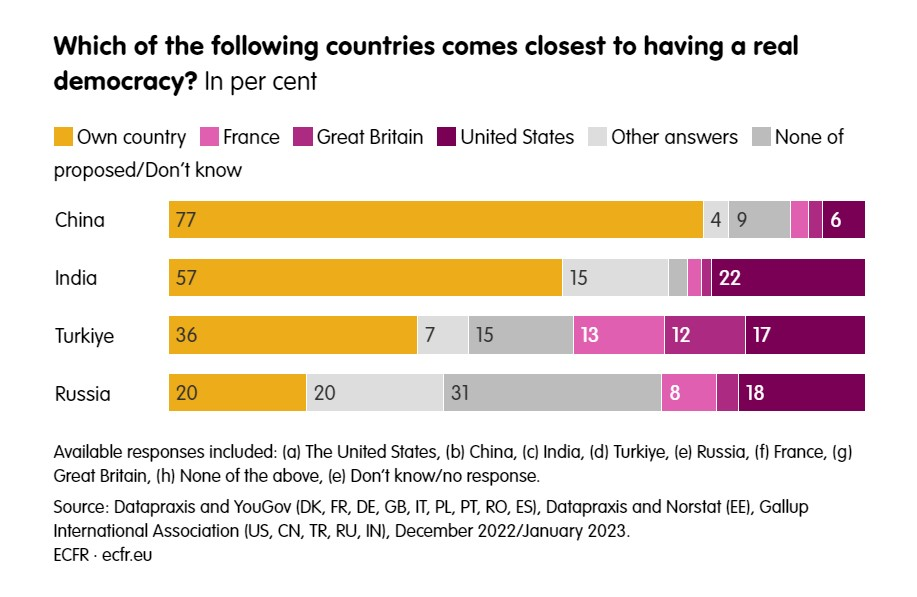(Added information from Lenin) Tag: Visual edit |
(Poll) Tag: Visual edit |
||
| Line 1: | Line 1: | ||
[[File:Democracy poll.png|thumb|A majority of [[People's Republic of China|Chinese]] and [[Republic of India|Indian]] people believe their countries are most democratic than the West in addition to a large minority from [[Republic of Turkey|Turkey]] and [[Russian Federation|Russia]].]] | |||
'''Democracy''', as of common consensus, as a concept, was formally conceived by the [[Ancient Greece|ancient Greeks]]. The word “democracy” comes from two Greek words being: people (''demos''), and rule (''kratos''). By popular definition, democracy is a method of rule wherein the populace have common power, as in the people have an active role within the steering and guidance of the [[state]]. Contrary to common conception, “democracy” is not a system within itself, but a basis upon which political organizations and structures are formed. Democracy became the method of rule within Athens, a part of the [[Base and superstructure|superstructure]], so to speak, however within the bounds of the [[Base and superstructure|material base]]. Thereby referring to [[Slavery|slave society]], the only persons eligible to participate were so-called “free men”, this not including women, children, and [[Slavery|slaves]], who made up the majority of the populace. | '''Democracy''', as of common consensus, as a concept, was formally conceived by the [[Ancient Greece|ancient Greeks]]. The word “democracy” comes from two Greek words being: people (''demos''), and rule (''kratos''). By popular definition, democracy is a method of rule wherein the populace have common power, as in the people have an active role within the steering and guidance of the [[state]]. Contrary to common conception, “democracy” is not a system within itself, but a basis upon which political organizations and structures are formed. Democracy became the method of rule within Athens, a part of the [[Base and superstructure|superstructure]], so to speak, however within the bounds of the [[Base and superstructure|material base]]. Thereby referring to [[Slavery|slave society]], the only persons eligible to participate were so-called “free men”, this not including women, children, and [[Slavery|slaves]], who made up the majority of the populace. | ||
Revision as of 22:36, 25 February 2023

Democracy, as of common consensus, as a concept, was formally conceived by the ancient Greeks. The word “democracy” comes from two Greek words being: people (demos), and rule (kratos). By popular definition, democracy is a method of rule wherein the populace have common power, as in the people have an active role within the steering and guidance of the state. Contrary to common conception, “democracy” is not a system within itself, but a basis upon which political organizations and structures are formed. Democracy became the method of rule within Athens, a part of the superstructure, so to speak, however within the bounds of the material base. Thereby referring to slave society, the only persons eligible to participate were so-called “free men”, this not including women, children, and slaves, who made up the majority of the populace.
Freedom in capitalist society always remains about the same as it was in ancient Greek republics: Freedom for slave owners.
Interpretations
Democracy in modernity has been split into many categories and has been countlessly interpreted and, at times, vulgarized by bourgeois thinkers. It may be noted that “democracy”, in all of its forms, are indeed a progressive force comparatively to the political systems proceeding it. Even the simplest liberal democracy serving the interests of the ruling class, is still superior to a direct dictatorship by class interests.
Bourgeois democracy
In practice, bourgeois democracies are a form of the dictatorship of the bourgeoisie. Capitalists and landlords control 90% of newspapers and meeting halls and prevent workers from controlling the state through bourgeois property laws.[1]
References
- ↑ Vladimir Lenin (1918). “Democracy” and Dictatorship. [MIA]